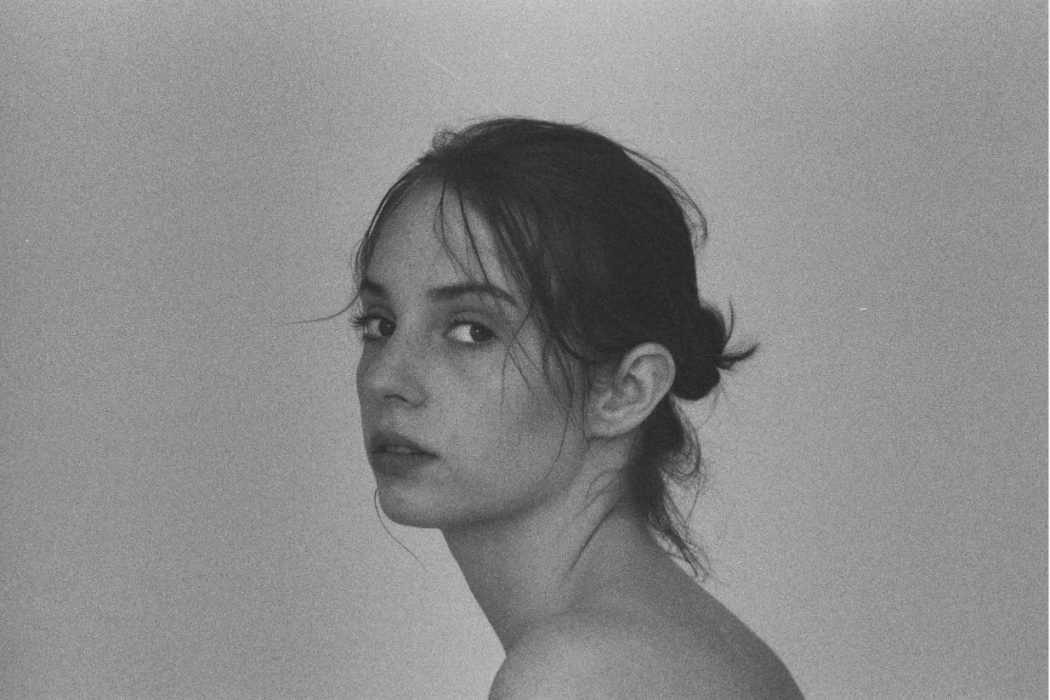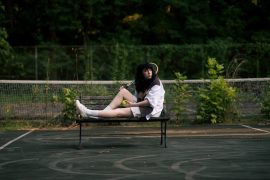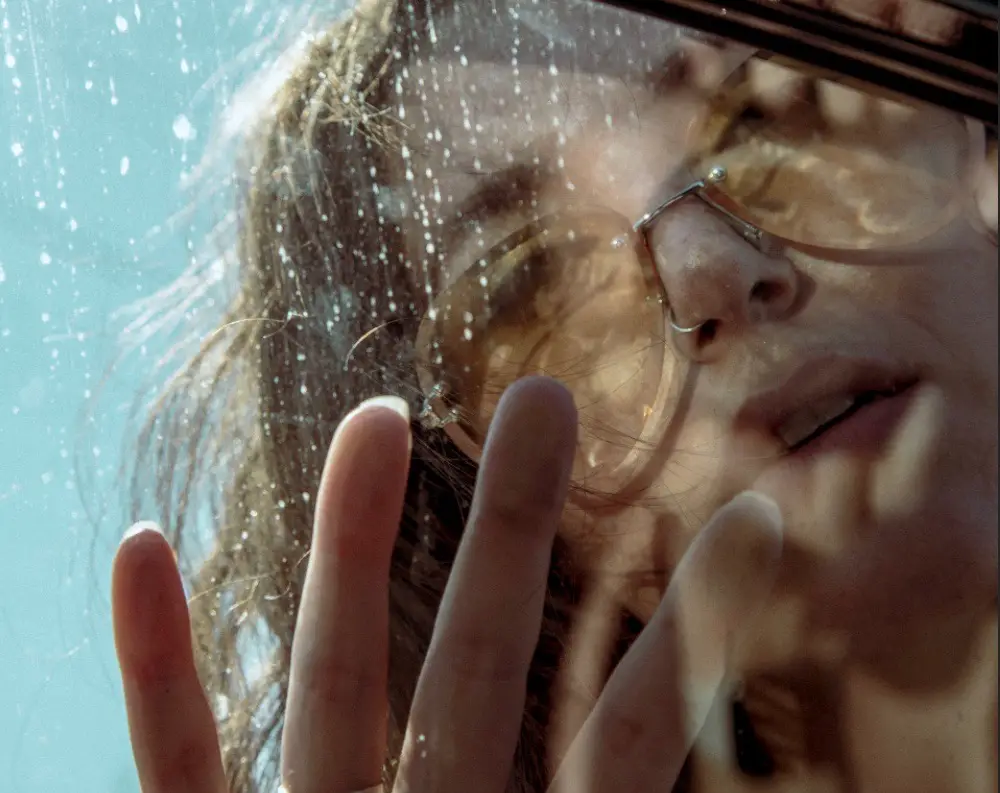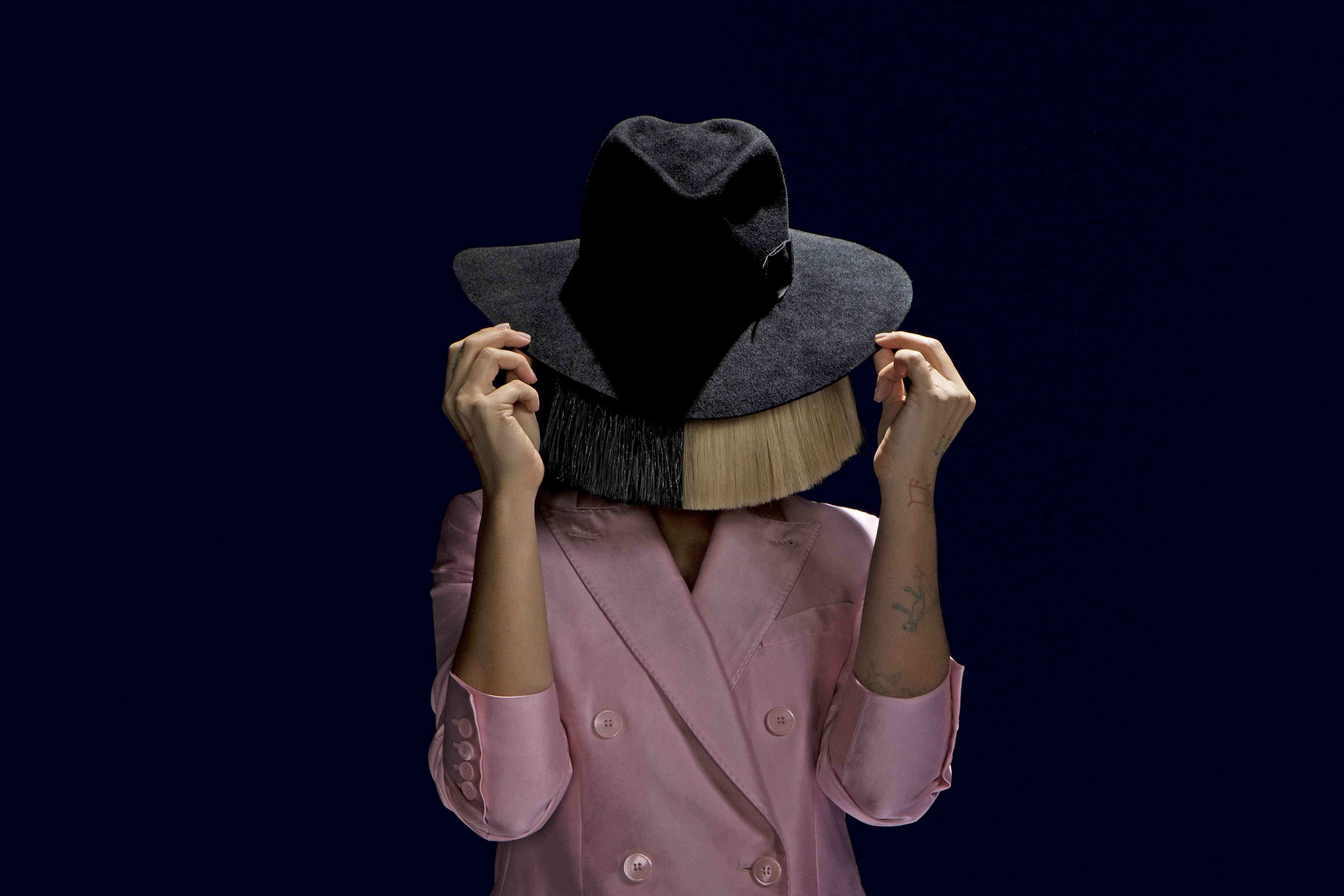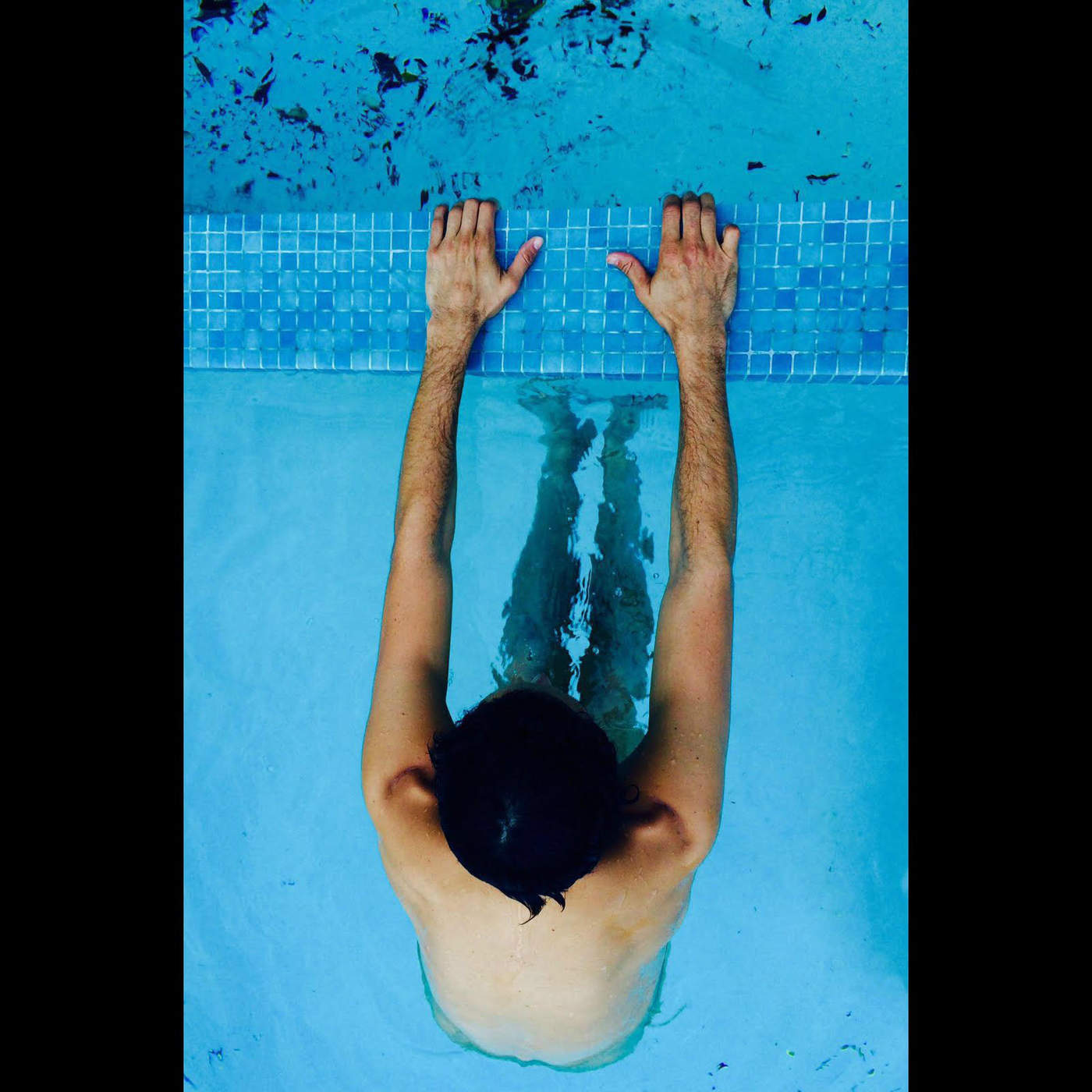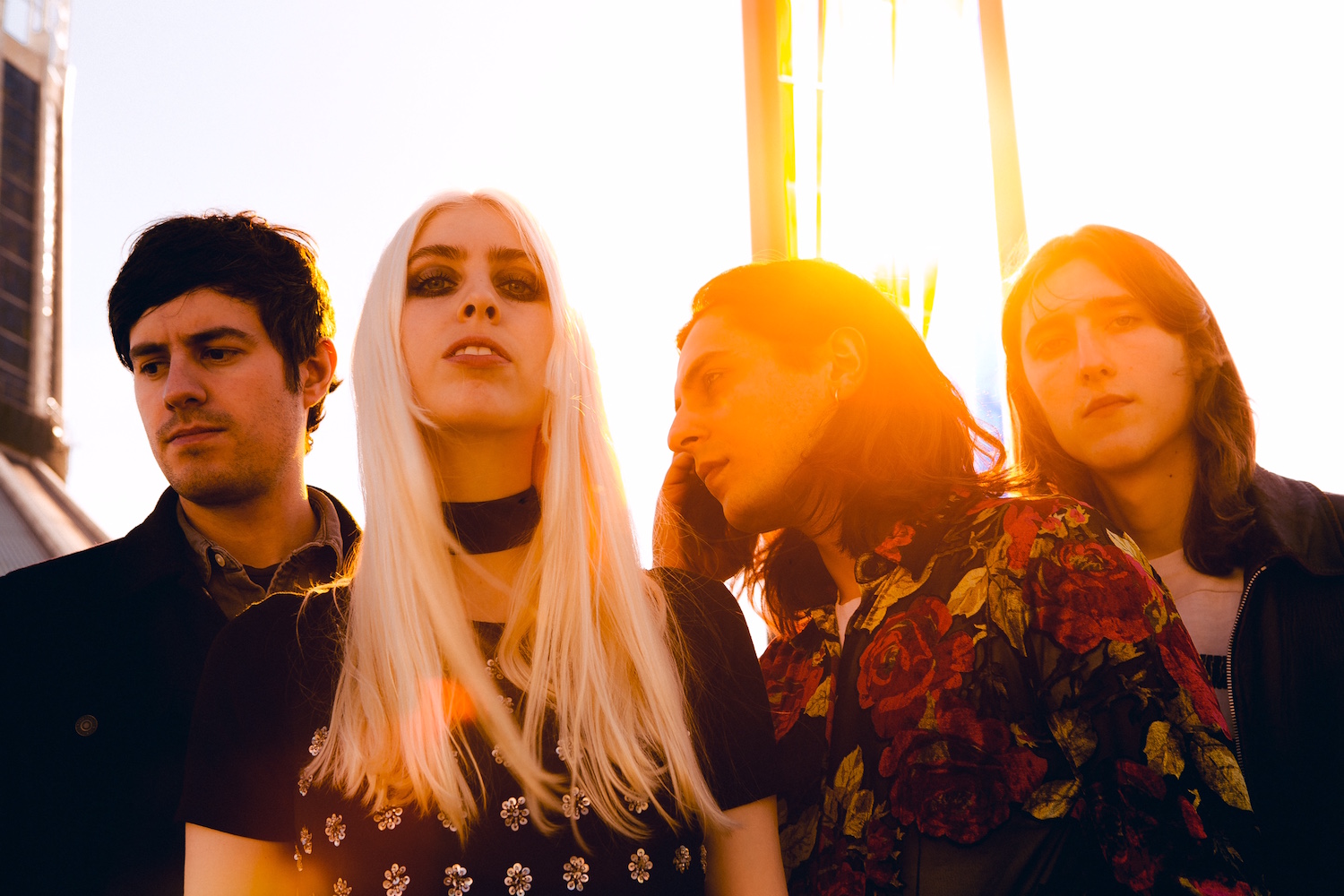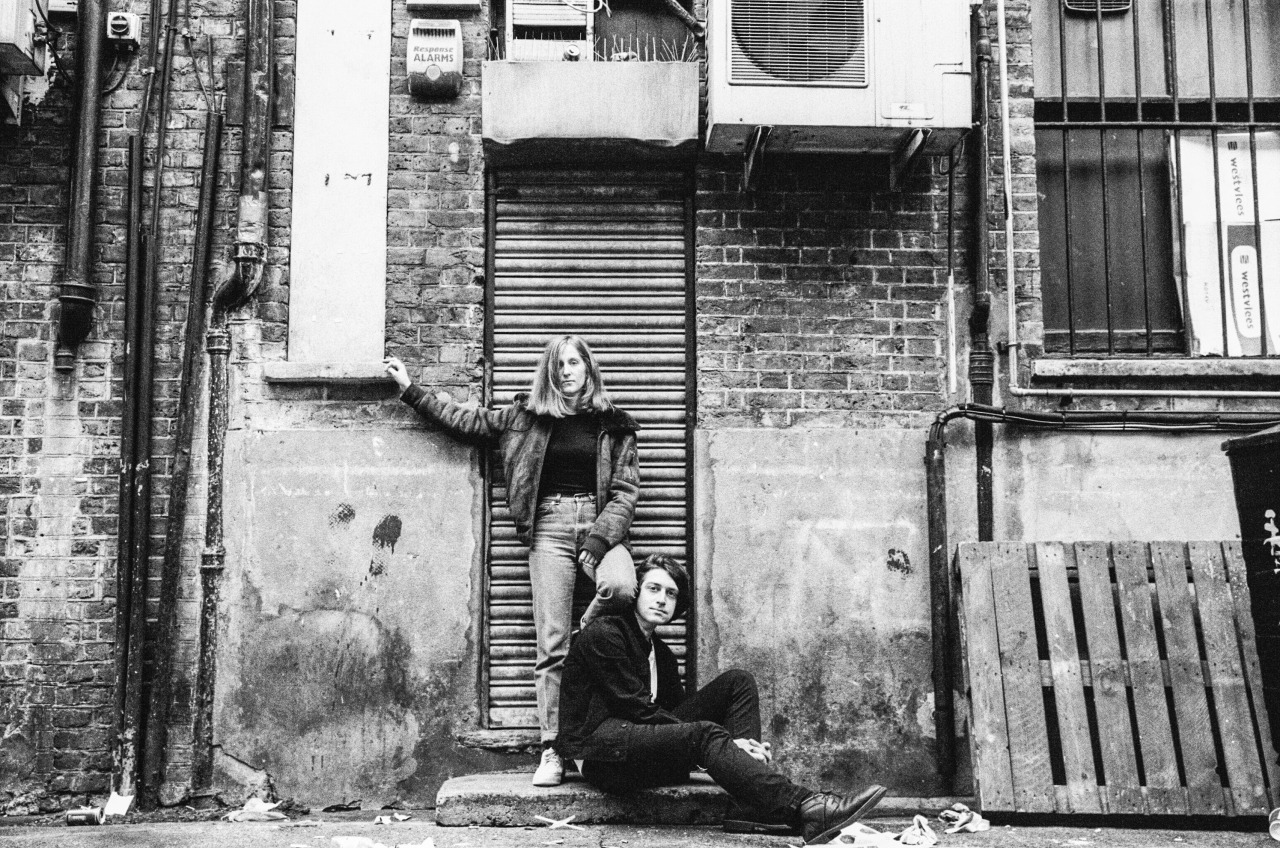Atwood Magazine speaks to actor and singer-songwriter Maya Hawke about her relationship with music, the origins of her album title, how different art forms influence Hawke’s creative process, and what it’s like to release music during a global pandemic.
— —
Maya Hawke is acutely aware of all the different personas that are intrinsically related to her name and face. Firstly, there’s Robin from Stranger Things, the sassy, intelligent, and hit show’s first queer character that catapulted Hawke into overnight fame in the summer of last year. Then there’s her surname and famous parents, Uma Thurman and Ethan Hawke, both of whom Maya looks so much alike it’s hard to separate daughter from parents. Hand in hand with that, there’s the assumption the world makes about the kids of Hollywood stars.
But Hawke is on another, more personal, mission, and she’d like you to join her.

On June 19th, Hawke is releasing her debut album, Blush, made in collaboration with Jesse Harris. The album is a collection of songs that reveal who the person behind all these different identities, names, and characters is. She’s a self-described “clown,” a “girl who is clumsy and stupid and loves poetry,” who talks fast and feels deeply, who loves the outdoors, whose storytelling technique is almost unparalleled for someone her age, who thrives in an environment of collaboration and is made up of a collage of artistic influences.
Hawke is someone who ultimately is extremely grateful for all opportunities she’s been given and can acknowledge and negotiate her privilege in a way few in her position are brave enough to do. Blush is Hawke, unfiltered, talking about growing up and playing no characters.
“Coverage,” the album’s second single (released today), is a song about negotiating the different identities Hawke can inhabit while balancing acting and the characters she plays and her real life. It examines how to tread the line between fantasy and reality, and what happens when the line is blurred. There’s deceit, pondering over her ability to be fully present, and what happens when those around you don’t understand how you weave in and out of characters and fiction for a living. All packaged with a delightful folk and rock-influenced tune.
Atwood Magazine spoke to Hawke about her relationship with music, the origins of the album title, how different art forms influence Hawke’s creative process, and what it’s like to release music during a global pandemic.
Listen: “Coverage” – Maya Hawke
A CONVERSATION WITH MAYA HAWKE
Atwood Magazine: Hi Maya! How are you doing? The world is really weird right now?
Maya Hawke: You know, I’m doing okay, I’m doing great. I’m so fortunate and lucky, I have family, I have places to go that are safe. I get to be by nature. I’m pretty much category one of lucky people at the moment, I am very grateful. You know, that said, it’s still hard. I wasn’t looking to be, you know, transported back into my teen years living with my family. Like, no friends and no lovers and no, you know, no work and no freedom and that’s not what I was looking forward to this summer.
But it’s hard and it’s hard to be an extrovert and, you know, move into total introversion territory but, um, but compared to what other people are going through, it’s really not bad at all. And, um, you know, I hate to say I’m trying to figure out how to make the best of it because I’m honestly not, like, I’m so not interested in seeing the silver lining right now, I just sort of want to sit and be sad. And yeah, it’s, like, but I’m, I’m trying to make the best of that of sitting and being sad. To this summer. So, I’ll manage.
Yeah, and I think also, I've been seeing all these posts online like “make the best out of this quarantine and be creative and work on this project that you've always wanted to work on “ and I'm just like, do you understand what's happening in the world like we don't have the energy to necessarily do what we’ve always wanted to do now.
Maya Hawke: This is not a vacation. I sit down to try to write and it’s either all I have to write about is this experience, and I don’t think my opinion on this experience has any value whatsoever, and I’m not interested in it, and other than that, I don’t have anything to say about anything in the world. And so I’m just so bored with my own brain.

I'm just going to dive into it: I love, love, love your album. I can't wait for the world to hear it.
Maya Hawke: That’s so kind of you, thank you so much for listening. I’ve never been so nervous about anything in my whole life. Oh my god. So it means the world to me when people listen to it, so thank you!
Oh my god, no need to thank me! I just want to start talking to you about your background in music. I read that your father used to make you playlists. Did that influence you in any way?
Maya Hawke: The real thing that made me want to make music was that I’m really dyslexic and I’m really struggled with school growing up, and I struggled to read and I struggled to write, and then I started trying to write songs. And I found that by accompanying melody to words, I could memorize them better, and I could understand them better and I could take more ownership over them. It gave me sort of my first opportunity to have ownership over language, which I felt like I had no ownership over because I wasn’t good in school and I just I didn’t feel, I didn’t feel like I was allowed to have any ownership over language, and then music kind of gave me permission and gave me a window into understanding poetry, without having to read it, and into writing poetry without having to write it.
And that was a big breakthrough for me in terms of my independence and my confidence. As a young kid, I mean, like, I’m talking seven or eight. I think I would… I started out, writing new lyrics to Hannah Montana songs. So it’s just, that’s how it sort of began for me, my relationship with music was through, you know, needing to have ownership over language in a way that made me feel anything other than pathetic. And then, yeah, I mean, my dad, music was always a big part of our lives and, like, whether it was like playing guitar in the living room or the playlists my dad would make me.
You know, a child of divorce it’s always complicated, and figuring out ways to stay connected to your children when you’re not in the same space with them is really hard, and so what my dad did was he would make playlists. So that was a really formative experience for me and the way I learned about music in a lot of ways.
I'm wondering if due to your newfound grasp on language because of music and then also the symbolism of the playlist, was music something that empowered you and did it make you feel better about everything?
Maya Hawke: I think empowering is a complicated word. Because one thing that can empower you is like sometimes, you listen to music and it makes you feel badass. You know, sometimes you listen to music and you’re like, oh, this makes me feel confident, this makes me feel vindicated this makes me feel strong, and sometimes you listen to music, and it’s not empowering in that way that it makes you walk down the street and feel punchy and strong. Sometimes it’s empowering in that it makes you feel heard.
Like, I loved this song when I was a little kid, a Lucinda Williams song called “Am I Too to Blue for You?” and I was always the kind of melancholy kid, and no one would describe that song as being like an “empowering” song. But it was empowering to me because it made me feel not alone and I was like “oh my god Lucinda Williams thinks she’s too melancholy, Oh, that’s awesome like I’m too melancholy and maybe that means I’m like Lucinda Williams and then I don’t have to hate myself,” you know.
And so, like I definitely found feeling heard and feeling like there were people, you know, feeling like there were people out there having similar feelings to me was really empowering in a different version of that word than I would hear or use.

Talking about poetry and language, I mean, your lyrics, they essentially are poems that you put melody to. But I wonder, if you do write poems that don't become lyrics. What is it about the act of pairing melodies and sounds to your words, that adds to the meaning of them to you?
Maya Hawke: Well, I totally have poems that don’t become lyrics, and, you know, I think there’s an. For me, and this doesn’t spread to everyone, but to me, there’s this simplicity that you can have in a poem that you set to music. I’m trying to think of an example from the, from the record, in “Goodbye Rocketship” there’s a line that’s like “I’m sorry, and I forgive you and I love you” and, you know just those kind of slightly tired phrases, those things that have been heard before and used before. I would never put a line like that in a poem.
Because you don’t get to perform it. In a poem that’s just written on the page, the words really have to stand for themselves, but in a song, you can perform it and that’s where you can add all these extra meanings. It’s like a song that is like building a structure and the words might be the skeleton, you know the words might be the scaffolding. But then you can hide all these other secret meanings, all these other extra layers of depth in the way that the song is performed and in the instruments you add into it.
Take the first song on the record like “Generous Heart”, the words of that song are one thing. But then there are all these other pieces – that song is probably the song that I had the most hand in the way the song was produced because I had a really clear vision for a kind of underscoring, secondary story that I wanted to have existed inside that song. And so like there’s a guitar part that is its own poem, it’s its own story, it’s its own emotion that is blending and cutting and moving in between the words and responding in a sort of call-and-response way.
So, you know, it is different to me, because there’s so many different… it’s like when you make a movie, like a play is one thing, it’s the actors on the stage and the sets, but a movie has so much other things, it has the soundtrack and it has the way it’s filmed and the way you cut the shots together and you cut to her eyes, or her chin or smile or hands and you can use all these different tools to tell the story, it’s not just the actor alone on a stage. Putting poetry to music is similar to me where you just are equipped with all these other storytelling tools. It’s not just the words it’s all of these tools, so they all have to come together in unison.
Do you see each song as a specific story and then, let's say, the album would be the whole book, like a compilation of stories, or do you like to look at an album as more of a story in itself and then the songs are the individual chapters?
Maya Hawke: I guess I feel like it’s a collection of short stories or a collection of poems. In my head, there’s a through-line to this album, but the songs don’t necessarily go in that order. I could order the songs in a way that told the story, but, there would be chapters missing of songs that we didn’t include. I ended up deciding to sort of order the songs in a way that has kind of a musical cohesion, rather than in just a straight-up storytelling way. So yes, there is a story in there from my point of view but I don’t know that anyone else will notice it.
Even though we won't get to see the whole story, would you want to give us like a hint of what it is?
Maya Hawke: Let’s see if I can do it in a way that works. I guess the story is about, you know, we move. We move out of being children. We move out of our parents’ houses, we move out of childhood into adulthood. And, you know, all of a sudden, are trying to build a life and build a structure for ourselves that feels like a structure, that feels like a life. And immediately we’re told that we’re 18 and now we’re grownups, and now we’re ready for sex and relationships and love and commitment and promises before we even know who we are.
And the idea that you can promise yourself to somebody before you even know who yourself is really complicated. So I guess it’s sort of about that, it’s about going from childhood, going from your primary relationships being ones that you have with your parents to your primary relationships being ones you have with your friends and lovers, whether you’re ready for that or not. And if you’re being honest about who you are or not. If you take a song like “Menace”, that song is about being like, ‘Oh, I want to be better for you, like I want to be a better person. I don’t want to be a troublemaker I want to be good, I want to be better.’
But by the time I finished writing the record that song took on a whole different meaning because when I wrote it I meant it. When I wrote it I was like ‘I don’t want to be a menace anymore I want to be good I want to make myself into someone that’s good for you’. And then by the time I finished the record I was like, ‘You know what? No. I don’t want to make myself smaller for you. I don’t want to make myself less, I want to be a menace. I want to be as big as I can possibly be.
And what was I thinking to think that I needed to cut myself off at the knees to make you more comfortable? I don’t’. Then that’s when I wrote a song like “Animal Enough”. and those songs come really close together in the record but happened in such different moments in my life. You know, the journey from there to there was a really big one for me, from “Menace” to “Animal Enough”. ‘Menace” is like, ‘Oh, I don’t want to be wild, I don’t want to be an animal’. And then “Animal Enough” is like ‘You know what? Actually not only do I want to be an animal, you’re not animal enough’, so there was a big change in sort of claiming yourself claiming your own energy, you know, working on yourself, trying to grow and be better and learn more, but not giving up parts of yourself that are important to you so that you fit in with another person.
Listen: “Coverage” – Maya Hawke
When the meaning of the song changes for you after you wrote it and you look back at it, as you did with “Menace”, do you revisit it and do rewrites, do you revise the production or do you just leave it to be like a mark of how you felt at the time?
Maya Hawke: Sometimes in live concerts, I sing [in “Menace”] “but I cannot catch my wandering eye” instead of “so I will.” But usually, I just leave it be and allow it to be sort of a time capsule of a way that I felt and maybe I’ll talk about how I’ve changed my mind on that premise, but I sing the song, the way it was. That’s probably the story of the record, figuring out the parts of you that are really you and the need to be held on to, and the parts of you that need to be grown out of.
Did you write these songs in real-time, while you were going through this change, or were they born out of reflection?
Maya Hawke: It was all real-time. I wrote all the songs over the last you know two years and each one felt so essential and absolutely true when I wrote it, and then later I can look back on and be like, ‘Oh my god I wrote that song about that schmuck?’, ‘I cared that much about that experience? I was so angry about that, are you kidding?’. Everything was totally alive in my body when it first came out, and it still is, you know, when things change over time. It definitely wasn’t written with any sort of wisdom or reflection, it was all written in sort of blood and guts and life.
I asked that just because we're basically the same age, so I feel like it's so hard to have that level of acute self-awareness that I see in the lyrics about what you're going through in real-time, and then be able to put that to paper and have it sound so wise, when you're actually not doing it as a product of reflection?
Maya Hawke: Oh well, thank you. I mean, upon reflection, I’ve tried before to go back to times in my life and write a song about something that happened a long time ago, with wisdom or reflection and I can’t really do it. Things become alive in my body, they jump up and electrify and the feeling gets really strong and I have a lot to say about it. And then I capture it and I write it down and it lives, and it is something I don’t generally write out of wisdom, I write out of passion.
'By Myself' was really apt as a first single, especially due to the times that we're living in, did you choose to have that be the first single, like as a last-minute thing or was it just coincidence that we all happen to be quarantining and by ourselves, when you announced the album and released it?
Maya Hawke: It was totally a coincidence. That song was the song that people listened to the most. I had a private SoundCloud page or whatever and I sent it to friends and I sent it to the record label and you can see the numbers of how many times people listen to a song and people listened to that one the most, so I just thought, ‘Okay, why not, that’ll be the first single, then.’ But then it happened to coincide with this insane national and international disaster.
And we’re quarantining by ourselves and I wouldn’t call it luck, I would just call it weird, dark coincidence. But the song is really about… That song I wrote a long time ago, and I think it’s the oldest song on the record, that song is, it was about, like, I thought I was having all of these experiences with people that mattered, and I thought that I was living this sort of wildlife and then all of a sudden it stopped. Everything stopped and I was alone and I was like, ‘Oh my god, I’ve actually been alone this whole time. None of these relationships are real, none of these experiences were real, I’ve always been alone. I’m still alone.’ It was a weird coincidence where that kind of happened again with this whole quarantine, where all of a sudden this happened and I was like, ‘Oh right’, it’s not that nothing was real, things are real, relationships are real, friendships are real, but everything stops and you’re by yourself and you’re like, ‘Right, I’m always by myself, it’s always just me.’
And, I’m lucky to build relationships and build friendships, but if I’m not my own ally, if I’m not my own best friend, then really I can’t be anyone else’s either. That’s what that song is about and it happens to be kind of alive and awake for me in a new way now as well.

'Coverage' is your next single, and it's the song where Blush, the album title, is mentioned. It seems to me to be a song about self-reflection and deceit.
Maya Hawke: That’s right on. It came from a sort of silly place which is like if you’re an actor and you’re dating a non-actor, when you do a romantic film with another actor, there’s always… If you pretend to be in love with someone long enough, you often start to feel. It’s not real, as soon as the movie’s over, it’s over. But you do start to feel some feelings about that person, you know? And when you kiss on camera or whatever like you’re really kissing that person.
I mean, you’re not always, like sometimes it’s a totally fake kiss, but if they’re doing a close shot you’re really kissing that person and, and you’re imagining what it would be like to be in love with them and, you know, it’s a complicated process. And if you’re in a relationship, it can be a hard thing to explain to a partner, and that song kind of came out of that – trying to explain what that is like, what that relationship is like, what that action of pretending to be in love with someone is like to someone who has never done it.
But then it’s also just like generally about lying and what does it mean to lie and, as an actor, how do you believe fully in something without letting it overtake you. How do you fully create an imaginary world for yourself and still hold on to your real one? “If I was really here looking at you beaming/ If I was really alive, could I make it through every daydreaming?”, which is like, if I was really fully present in my own life, could I live this life of imagination, could I live this life of dreams if I was really alive in my own life? And the answer is, of course, yes. And the only way to be a great actor is to be fully alive in your own life. To fully experience things, you know, but it doesn’t mean it’s not hard.
Since Blush comes from this song, why did you choose this album title?
Maya Hawke: I’m so excited to talk to you about that! I mean, basically why I named the album Blush is that I really struggle with embarrassment. I really struggle with shame and embarrassment and I so often feel humiliated. Like, I just so often feel ashamed of something I’ve said, or of something I did, or of even just existing, of trying to be an artist or trying to be an actor or trying to talk about my music like it’s important. How to understand and contextualize my luck and my advantages in life and in this industry and how to, how to go into the industry and into the world and try to think I’m worthwhile and think my words are important and think my voice is important, while knowing that they’re not important. I really struggle with it.
And yet, like, it’s something, as a girl like you’re not supposed to feel ashamed. You’re not supposed to feel like dark or humiliated or embarrassed. You’re just supposed to blush, you know, like blushing is this sort of feminized version of shame, where it’s like, ‘Oh, it’s so cute. She’s blushing, she’s embarrassed you know she’s so cute’. And like, it’s this, it’s this cute feminized way of looking at shame, because that’s when someone blushes, when they’re, ashamed and when they’re embarrassed. And yet, when we talk about women being embarrassed we talk about it like it’s cute. So that’s why the album is called that. And then it has a double meaning which is like a mask, a costume.
You know, in that line in the song, “with blush or blues or lights or greys.” It’s, like, there are all these ways to hide. We have all these ways to hide behind makeup, costume, lights, performance. So it’s about those two things it’s about being exposed by your own face, like, you’re trying to hide your shame and embarrassment, but then you’re blushing and you can’t; and then there’s also like blushing is feminized and it’s like a cute version of shame. So even when you’re exposed by your own body, it’s still somehow made cute. And then there’s it’s also this mask, like, the makeup, the double meaning of the makeup. It’s a mask. It has a lot of meaning for me.
Do you think you’d feel the same way, about struggling to believe your voice and work mattered, if you weren’t the daughter of Uma Thurman and Ethan Hawke?
Maya Hawke: Well, I mean I don’t know because they are. And I know a lot of people struggle with imposter syndrome, even if they don’t have the advantages that I have. So maybe I would feel exactly the same way, you know struggle with issues of being inadequate, being good enough. I think everyone struggles with that. Not everyone has the ways in which they are an imposter so readily available to the global community, not everyone has people looking at them and seeing their advantages so clearly spelled out in front of them.
It’s impossible to succeed in this industry, and almost everybody who does has had a leg up, or someone who did something for them or someone who helped them out at some point, almost everyone – not everyone, there are people who had no help, had nothing, no friend that ever made a call for them or nothing there are those people, but a lot of people did. But not everyone’s is so obvious. So I do have strong, intense feelings of feeling undeserving, of wanting to prove myself that is amplified by that, but I’m sure I would feel that anyway.

The summer of last year was when you “broke out” and got so many fans and so much validation from people, and now even more with your music about to be released too. Do you feel like this helps you deal with this feeling or is it just gonna be there regardless?
Maya Hawke: I think the only thing that will help me is true time and true experience. I’m still 21 years old, and just started my career and have gotten incredibly lucky to be welcomed into a show as popular Stranger Things. Like I didn’t make Stranger Things a hit, I didn’t make Robin awesome, the Duffer Brothers made Robin awesome, and the Duffer Brothers and the cast made Stranger Things a hit. I just got to come along for the ride. And, you know, I didn’t make my name have power, I was born and my name had power.
So I think the only thing that will really ease it is true time, true experience, true years and years of work in that I can stand behind and feel proud of, I think that’s the only thing that will really help those feelings. But I’m so grateful to Robin, I’m so grateful to my parents, I’m so grateful to the Duffer Brothers. I still sit in a position of feeling so grateful, you know. I don’t take a lot of responsibility for the success of those things you know I’m just really grateful. This album is incredibly scary to me because it’s one of the first things that I’m putting out into the world as an individual.
And yet I’m still collaborating with Jesse, and I’m still grateful to him for all the help, that he got involved with this project and this project, wouldn’t have happened in the way that it happened without him. And so it’s all collaborative, it’s all a journey, and it’s all, part of my growth and development.
Yeah, that's a question I had for you actually. Then the world currently knows you through the characters you’ve played, or they know you as the daughter of two extremely talented, famous, and successful people. Now with the album, you're getting to, like, present yourself in a very unfiltered and vulnerable manner and people will get in touch with you and your art, with your own words your own feelings, and it can be very difficult to negotiate all the identities the world see you through. I know you're nervous about it because you've mentioned it, but like, what do you think about finally being like ‘this is me, these are my words and this is my story’?
Maya Hawke: Yeah, I’m excited. I’m excited. Of course, I’m of course scared that people will hate it, and scared that it sucks, and scared of disappointing people who supported it and thought it was good and then if the world doesn’t think it’s good. It’s all terrifying. But it’s also the most exciting thing I’ve ever been a part of in my life. Just the agency that I feel in having written these songs, the agency I feel in getting to perform them, the environment with the band, and all of that energy behind it all, it’s been kind of the most fun I’ve ever had in my life.
And I’m really excited to get to exist in public, in a way that’s closer to how I feel as a person in real life. Because, you know, like, I don’t see myself as Uma Thurman and Ethan Hawke’s daughter, I don’t see myself as Robin from Stranger Things. I see myself as a girl who grew up in New York and loves her friends and who is clumsy and stupid and dyslexic and loves poetry. I’m excited to get the way that I see myself be more a part of the conversation and feel kind of a more cohesive being and not have my private self be so different than my public self. Yeah. That is really exciting to me.
People aren't gonna hate it, I promise you. But I want to dive into your lyrics a little bit. There’s a lot of nature imagery in your writing, the ocean, the sun, and the river, and you pick powerful elements. I know you grew up in New York, which is a big city, so what's your relationship with nature and the outdoors?
Maya Hawke: I went to school in Manhattan and Brooklyn, but my mom grew up in upstate New York and Woodstock, and I have a house there, and I spent every weekend my whole life there. My identity was always really embedded with being like a river girl. There’s a stream that runs through my mom’s house, in order to get there you drive over this little bridge over the stream, and my whole childhood I really had a hard time making friends at school, I had a hard time getting good grades in school, I had a hard time in life and in school and in the city, and where I felt myself, where I felt free was in that stream catching frogs and tadpoles, and taking river stones and turning them into red clay and painting my face, and lying outside at night and looking at the stars.
I have always felt a tremendous connection to nature and animals, I horseback ride, and I love dogs. I wanted to be a farmer when I was a kid. I was on the school bus when I was a kid and these, like, girls from Chapin were like “So what do you want to be when you grow up?” and I said “I want to be a farmer,” and they laughed at me and they’re like “Oh my god why would you want to be a farmer? Don’t you want to be a movie star?” and I was like, “Absolutely not.” And I still want to be a farmer, my dream is still to get myself, like, a house partner and get to have a beautiful farm somewhere and raise cows and horses and big Bernese Mountain dogs. That’s my dream for my life. And I see everything, I see human beings as nature, I see New York as being a part of nature.
You know, the river runs through New York, the trees grow in Central Park, the sun shines there. All those elements, all those things, exist in my city. The last song on the album, “Mirth”, that’s the one song in the record I wrote all by myself and played guitar on. And that song is like about those connections to that city.

Why do you feel that you gravitate towards the outdoors to write? Why do you feel that these are the elements and images that help you communicate what you're feeling?
Maya Hawke: I mean, it might be because I have a real attachment to classic poetry, I have a real attachment to Shakespeare sonnet form, Emily Dickinson, and Edna St. Vincent Millay, and Sylvia Plath. I’m a real student of more classic literature and classic poetry and for a long time, those symbols have been used as metaphors to talk about your feelings. I think it was Emerson or Thoreau, but someone in the transcendentalist movement was part of the Fruitland commune in Massachusetts, wrote that we don’t talk about time, because we look at the river and watch it flow, the river flows so that we have a metaphor to use to talk about time. I just botched that quote, but the basis of it is that I think those metaphors are really powerful, and I’m really inspired by that classic literature and it matters to me.
Now we're going from the most natural to maybe some of the most absurd elements of your music. In the music video for “By Myself” you are a space cowboy angel, and in the video for “To Love a Boy” you're a mermaid. You're incorporating all these supernatural, mythical creatures that don't exist in the real world to serve as visuals for stories that are so grounded and so human. Why did you make these decisions, are they conscious? And what is the next costume we might see you in?
Maya Hawke: I don’t know what you’ll see me in next because I don’t know when I’ll be able to film another video because of the crazy coronavirus, but it is conscious. I mean, partly it’s that I’m trying to integrate my relationship to music with my relationship to acting, and I love costumes. I love to camp, I love costumes, I love playing. In me, there is this tremendous vulnerability and groundedness but there’s also this real clown, real performer, and real jokester in me. And there’s this intense kind of earnestness to a lot of my songs and they come from such a vulnerable place, and I like contrasting that vulnerability with that kind of play and lack of self-seriousness.
With the “By Myself” video it’s like, yes I do feel powerful, I do feel feelings strongly, but I don’t take myself that seriously. My go-to kind of contrast is you have to take the work seriously but you don’t have to take yourself seriously. And I take the work so seriously, I take music so seriously, I take acting so seriously but I do not take myself seriously. I do not think I’m important, I think I’m a clown, I don’t think that the fact that I got my feelings hurt in x situation is important. I think it was important to me in the moment, but I think what’s important is all of our feelings and all of us coming together and all of us playing, and so I like to incorporate those elements of play into my videos to kind of contrast the, the self-seriousness and the intensity of the emotion in the songs.
Speaking of costumes I read on your Instagram that you painted the cover of your album to be like the girl in the pearl earring. First of all, why that specific painting, and secondly, do any other art forms influence your music?
Maya Hawke: All other art forms influence my music. I took this class in high school called interdisciplinary arts, and basically what we would do is we would do these translations, where you would look at a painting and then you would write a poem about it, and then you would look at your poem that you wrote about the painting and paint something based on that poem, and maybe then write a short story based on that painting, and you would just take an art form and keep translating it.
Artistic translations, that was such a formative experience and class for me because it was so liberating where it was like ‘Oh, there’s no such thing as originality right? Every idea has been said a million times over. But what can be original is the way you say the idea’. So it’s not about whether or not you being in love is the first time anyone has ever been in love. It’s about how specifically can you talk about how you are in love, how particular can you be with the minute particulars of your experience, so that it can be even more relatable to people? So those artistic translations are such a tremendous source of creative freedom for me. And reacting. You know, acting is all about reacting and I think so is all art, it’s a reaction to life, it’s a reaction to other people, a reaction to your collaborations.
I painted the front cover but my best friend painted the lyric booklet that’s going to come with the record. And another friend of mine did the back cover of the record, so I’m always inspired by these collaborations and translations. And The Girl with the Pearl Earring has just always been one of my favorite paintings. I love her expression. It’s simultaneously, like tricky, it’s a little frisky, and flirty almost, while still being so angelic and vulnerable. So often as women the classic example is like madonna whore complex, which is like, either you’re an angel virgin, or you’re a promiscuous, devil.
And every woman I know who is neither. Everyone exists in these in-betweens, and in these gray areas, and that is an old painting that looks to me like a girl I would know, a girl I would be friends with, a girl I can relate to and connect with.

Your album will probably be released during this very weird worldly time, I don't know if we will still be holed up in our houses on June 19, but maybe. What do you hope that it brings people, given the situation that we're in?
Maya Hawke: I think we will still be holed up in our houses, by then, and I don’t know… I think that this time, if you’re not struggling with death or with illness, or even if you are, I think that this time can be used for real self-reflection and taking a moment to step out of the rat race, out of your normal patterns and reflect on – you know, I’m super not into people with tremendous privilege being like, ‘This is an opportunity to reflect and better yourself,, I think it’s so stupid and annoying, and I don’t think that it’s that for most people, I don’t think it has to be that.
And I think that it comes from such a place of privilege to say that it should be that, but I do think that no matter what situation you’re in, it can be an opportunity to feel your feelings, without having to force them through a meat grinder. So often, something happens and then you have to get up and go to work in the morning. Like your heart gets broken and you have to go to work and you have to not think about it, or you lose a loved one, and you have to go to work and not think about it because if you sit and wallow in your feelings all the time you’re never going to get anything done.
And this is a moment where you can think about it, where you can self-reflect. I guess so often for me music and records have been tremendous tools for self-reflection. I listen to a Phoebe Bridgers record and I’m like ‘Oh my God, thank you for putting your feelings that way because now I know how I feel about this thing, and that helps me so much to see myself with more clarity.’ And in my wildest dreams, this record could be that for one person.
One person could have a moment where they were listening to it in this time and they were like ‘Oh, that helps me understand my relationship with my father,’ ‘Oh, that helps me understand my relationship with drugs and alcohol,’ ‘that helps me understand my relationship to lying,’ you know, whatever it is. You know those moments. If one person could have an experience like that with this record in this time period, I would feel totally vindicated and like I did something good.
In a perfect, not pandemic-riddled world, what's the perfect situation in which to listen to your music?
Maya Hawke: My first instinct is to say like on headphones in the backseat of a car in the rain, or walking through the city where you live, or in your room at night when you’re falling asleep.
Okay, and now this my last question. What's the last great thing you listened to?
Maya Hawke: Oh, well Dylan’s new song is amazing, I listened to that recently. And also, I know I’m so late to the party but I just discovered Ariana Grande’s thank u, next. I didn’t read Harry Potter until 2015 so I’m always behind the curb. But that whole album, has been the soundtrack to my quarantine, “imagine,” “needy,” “NASA,” and “fake smile” all feel so alive in my body right now, I know that’s like two very different things but those are the two groups of things I’ve listened to recently.
I’ll say one more thing. The other thing I’ve listened to that really spoke to me recently is, the guy who plays bass in my band, Benjamin Lazar Davis, just put out this new song with Bridget Kearney and called “Endings and Beginnings” and you should check it out because it’s amazing and it’s also great corona listening.
— —
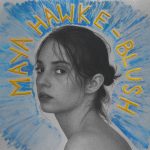
Connect to Maya Hawke on
Facebook, Twitter, Instagram
Discover new music on Atwood Magazine
? © Theo Wenner
:: Stream Maya Hawke ::

